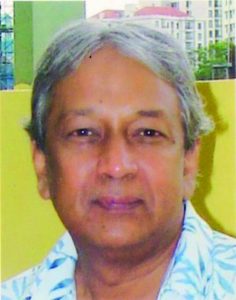
~By Dilip Bobb
When Nobel laureate Amartya Sen titled his book “The Argumentative Indian”, he was stating the obvious. We Indians love to argue, over love—and everything else, and here’s another obvious truth, we hate to lose an argument, which means we end up with arguments that never end and a possible title for Sen’s next book—The Angry Indian. Here’s a look at some prominent arguments that seem to have no ending.
Why India needs a bullet train: The fastest growing economy needs faster trains, especially when it connects Gujarat to the rest of the country. Gujaratis have a yen for fast-track development and for leapfrogging technology that will propel Old India to New India faster than, well, …a speeding bullet. The best pro argument: it’s virtually free thanks to Abe, the Japanese guy, not Lincoln.
Why India does not need a Bullet Train: 25,000 people died last year, not hit by bullets but thanks to 28,360 railway accidents. Bullet trains are elitist and exorbitantly expensive to operate and maintain. The same money could be spent on modernising and upgrading the existing railway system used by a majority of Indians. For them, bullet trains are a luxury that should be derailed. They prefer arriving late to being The Late.
Has Modi’s obsession with disruptive innovations undermined the economy? There is enough evidence to show that demonetisation was all pain, no gain, led to massive loss of jobs and lowered the country’s GDP by a significant amount. Between GDP, GST, JAM (Jan Dhan-Aadhaar-Mobile), FDI (First Develop India), RBI and NITI, India’s economy is in danger of collapsing under the weight of too many clever acronyms. We could have one more: RIP.
The Bountiful Benefits of Notebandi: This is a time for sacrifices; our soldiers are dying on the border, so why are people cribbing about having to stand in line to withdraw their money? Those who understand voodoo economics will know the bounty and the benefits—black money has been eliminated, terrorists from Chhattisgarh to Kashmir are starved of funds, so we are winning the war on terror, a less cash economy is better than cashless people, or the other way around, and finally, anyone who objects to demonetisation will be declared an anti-national by Paresh Rawal and/or Arnab Goswami.
Who killed Gauri Lankesh?: Demonetisation. It had killed the economics of her weekly, so she wrote her own obit. Her brother. He had fought with her and was seen waving a pistol, or was it a makeup kit? The person she had taken a loan from was threatening her, a sub-editor she had scolded was thirsty for revenge, some real estate shark was after her property and finally, the Naxalites had every reason to see her buried and attributed her killing to Brahminical Fascist Goons.
Who Really Killed Gauri Lankesh?: Brahminical Fascist Goons.
Is Dynasty a boon or doom? According to Narendra Modi, it’s not in India’s DNA, or NDA, but in its RSVP, which stands for Rahul, Sonia, Vadra and Priyanka. The BJP, says Amit Shah, has removed dynastic succession in Indian politics, so please ignore Jayant Sinha, Poonam Mahajan, Dushyant Singh, Yashodra Singh, Varun Gandhi, Pankaja Munde, Anurag Thakur, et al, someone forgot to inform Mr Shah of their existence.
Is Dynasty a boon or a bust? Over to Berkeley where Rahul Gandhi, during the course of an electrifying speech (so say Congress spokesmen), reminded us that that is how India runs, that’s how India works, so please leave me alone, or words to that effect. He had a point, or four (poor Abhishek Bachchan), which was somewhat blunted by dragging in Infosys, which finds itself in somewhat dubious company. Bottom line: dynasts are not an accident of birth but a fact of life, so suck it up, as the Americans would say.
Is the Modi Honeymoon over?: Honeymoons are passionate and intense and replete with love and mutual bonding but here’s a fact check: they rarely last. Certainly not for three years which is a long time in politics. We still await the promised acche din, instead there’s a lot of din and divisiveness and not much dhan in Jan dhan, or anywhere else for that matter. The honeymoon is certainly over but the marriage survives because of a third party, called Tina (There is No Alternative).
Is the Modi magic fading?: In his own words, in a tweet on the third anniversary of his government, he says: “Last 3 years have seen concrete steps that have transformed people’s lives” listing areas like agriculture, women empowerment, Make in India, tourism, solar energy and distribution of LED bulbs. In other words, the light has not gone out of our lives.


